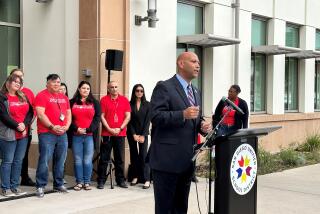Women Shun Top Office to Stay in Teaching Trenches
- Share via
HARRISBURG, Pa. — Principal Margaret Jaskulek doesn’t want the spacious desk, the high profile and the nearly six-figure salary that accompany the key to the superintendent’s office.
She has turned down superintendent job offers in two districts in the past two years to continue working at a struggling urban high school in Philadelphia.
“I don’t want a promotion and I don’t want the raise if it means I have to work in a building that students never even enter,” said Jaskulek, who works at Samuel Fels High. “I want to be relevant to young lives, and this is where I get to do that--in the trenches.”
Around the country, educators point to people such as Jaskulek as they struggle to explain why there are so few female school superintendents when the teaching profession is otherwise dominated by women.
According to the American Assn. of School Administrators, the number of women occupying the top office in school districts across the nation seems to have stalled at just under 20% in most states.
“Ironically, women have made great strides in breaking into the executive office in almost every profession except the one in which they are most involved--education,” said Judy Seltz, ASSA director of planning.
In Pennsylvania this year, 14.8% of superintendents are women, compared with 11.8% in 1991. New York and Texas have also seen only minor gains in the past 10 years, settling at 17.7% and 13%, respectively. In all of these states, women constitute more than two-thirds of the teaching work force.
In California, state education officials said they have held seminars that encourage women to apply for superintendent positions.
In recent years, finding qualified applicants of either gender has been tough across the nation. Since 1999, the top positions have been vacant in nearly half of the country’s 50 biggest school districts.
The job’s lack of popularity doesn’t surprise those who study education. The superintendent’s post can be highly political, and occupants often deal with multiple interest groups, a powerful school board and unending turmoil.
Would education be different if there were more women superintendents?
“Absolutely,” said Becky Langford, a researcher at the Center for Creative Leadership, an education think tank in North Carolina. “Studies have shown that women tend to bring strong new ideas on organizing an office and making it accessible to customers or, in this case, the public.”
More to Read
Sign up for Essential California
The most important California stories and recommendations in your inbox every morning.
You may occasionally receive promotional content from the Los Angeles Times.













